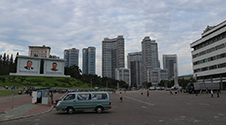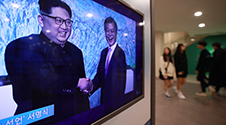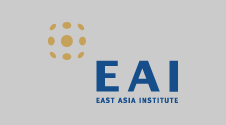
2020 North Korea: A Head-on Breakthrough of Two Major Challenges
Commentary | January 10, 2020
Young-Sun Ha
The Chairman of the Board of Trustees of the East Asia Institute, and also a professor emeritus at Seoul National University
In place of his annual New Year’s speech, Kim Jong Un presented the report, "On Social Construction and the Internal and External Policies of the Government of the Republic at the Present Stage" at the Fifth Plenary Meeting of the 7th Central Committee of the Worker’s Party of Korea (WPK) in December 2019. The report specifically emphasizes North Korea’s internal and external difficulties, as well as its determination to overcome economic sanctions and evolve into a socialist powerhouse. As part of its head-on breakthrough strategy, North Korea has proclaimed that it will soon present a "new strategic weapon" and commit to developing its self-reliance in dealing with its domestic and international challenges. In this paper, Young-Sun Ha, chairman of EAI and professor emeritus of Seoul National University, argues that North Korea’s old ways of pursuing a head-on breakthrough are not enough for overcoming the country’s present challenges. For example, presenting security threats to the US through continued nuclear development will only tighten sanctions, thereby endangering the regime’s security rather than ensuring it. The author suggests that North Korea’s true head-on breakthrough will be to speed down the path of denuclearization and economic opening-up. Within this framework of a new head-on breakthrough strategy, South Korea’s role would be to cooperate with the international environment and help pave the way for the North Korean regime to develop domestic capabilities until it is stable enough to run on its own.
North Korean leader Kim Jong Un replaced his 2020 New Year’s address with a report entitled “On the Orientation of Our Immediate Struggle under the Present Internal and External Situation,” which was presented at the Fifth Plenary Meeting of the 7th Central Committee of the Worker’s Party of Korea (WPK) in December 2019. The report came eight months after his speech at the Supreme People’s Assembly in April, “On Socialist Construction and the Internal and External Policies of the Government of the Republic at the Present Stage,” which outlined the basic plan for his national strategy. These shed light on how North Korea subjectively understands its internal and external environments and envisions new measures and policies going forward.
Compared to the speech in April, the December report places particular emphasis on the difficulties posed by North Korea’s internal and external environments. For example, in the report, Kim assesses “that the challenges that have faced [North Korea] in the past several months have been so harsh and dangerous that others would not withstand even a single day but yield to them." With the increased recognition of both internal and external challenges, Kim has named this year’s propaganda slogan, “Let Us Break Through Head-on All the Barriers to Our Advance!”
In analyzing domestic and international affairs, the December report highlights pressure from economic sanctions as an external challenge and difficulties of building a socialist power as an internal challenge. To begin with, Kim Jong Un points out obstacles faced by North Korea in implementing its three-step denuclearization policy. Such approach has been continuously echoed in statements ranging from the April 2018 announcement of the new strategic policy line to Ambassador Kim Myong Gil's press conference in early October, which followed the breakdown of working-level talks in Stockholm. For the first step of denuclearization policy, North Korea initiated the discontinuation of nuclear and ICBM tests and dismantlement of nuclear test ground as a confidence-building measure in exchange for a suspension of the joint ROK-US military exercises. For the second stage, the regime demands for an end to the US hostile policy towards North Korea and the lifting of economic sanctions in place of an immediate dismantlement of the Yongbyon nuclear facility. These measures are to be taken in accordance with the “action for action” principle and ensure North Korea’s regime security. For the third step, North Korea proposes that nuclear disarmament talks on the Korean Peninsula and its surrounding areas be conducted from the perspective of ‘denuclearization on the Chosun [Korean] Peninsula’ as North Korea moves towards complete denuclearization.
Yet North Korea has declared that it “cannot give up [its] future security just for visible economic results and happiness and comfort, given that there has been no change in [its] external environment owing to the US gangster-like acts both in the days when we went along the road of pushing economic construction and nuclear arms buildup in parallel and at present when we are working to concentrate all our efforts on economic construction and that hostile acts and nuclear threat and blackmail are still being intensified.” The December report further adds that “the world will witness a new strategic weapon to be possessed by the DPRK in the near future.” Such statements show North Korea’s shift towards a second byungjin line policy (parallel development of economy and nuclear weapons) after the policy of parallel development of the economy and nuclear weapons was declared in March 2013 and the nuclear-based economic construction policy in April 2018.
In regards to external breakthrough, efforts to secure deterrence by developing nuclear weapons and making direct security threats to the US will only complicate rather than resolve North Korea’s international challenges. This is because the stronger North Korea’s nuclear deterrence grows, sanctions will tighten upon the regime and paradoxically threaten its security. At the same time, it is highly unlikely and impractical for the US—which abides by the principle of nuclear non-proliferation in preserving the international order—to accept a nuclear freeze over North Korea’s complete denuclearization.
Secondly, North Korea continues to view the economic front as the basic line of its policy for overcoming internal challenges associated with its development into a socialist power. The regime hopes to reform the economic sector and mobilize all available production capabilities to sufficiently satisfy the demands of its people and continue pursuing economic development. These initiatives are key to North Korea’s current economic agenda.
As such, the December report states that all sectors of North Korea’s economy showed a growing trend in 2019 despite “the heinous sanctions imposed by the hostile forces.” Yet the report also points out domestic economic challenges, contending that ”the conditions of the national economy have not turned better remarkably as a result of the failure of the motive force of its development to recover, and that the state's capability of execution and control for fulfilling the important economic tasks is weak.”
Consequently, the report boils down North Korea’s economic concern into competition between self-reliance and sanctions. It also highlights that while “it is true that [North Korea] urgently need[s] [an] external environment favourable for [its] economic construction, [it] can never sell [its] dignity which [it has] so far defended as valuable as [the people’s] own life, in the hope of gorgeous transformation.” According to the report, the forces of sanctions will only increase if North Korea does not place an effort strengthen its self-reliance while awaiting the lifting of sanctions. Hence the report reaffirms the regime’s determination to engage in a head-on breakthrough of the tightening grip of the sanctions scheme and destroy it completely with the power invested in its self-reliance.
However, North Korea cannot deal with its economic challenges with self-reliance alone. For China, it took around four decades of reform and opening-up since 1978 for the nation to accelerate its economic growth and emerge into the world’s second-largest economy behind the US, with a gross domestic product (GDP) of 14 trillion USD and per capita income of 10,000 USD. With a a mere 1000 USD per capita income, it will take North Korea an extensive period of accelerated economic growth to survive the global economic market in the 21st century. In that regard, lifting of economic sanctions through denuclearization is a necessity, not an option.
Kim Jong Un ends the December report by calling forth North Korea’s revolutionary spirit with the Worker’s Party of Korea (WPK) at its core. He states that “[North Korea] should not look for the way of getting [itself] adapted to the objective factors to be controlled by them in the current struggle, but make a breakthrough head-on to put the objective factors under our control.” Yet it is impossible to successfully overcome current obstacles with nuclear deterrence and self-reliance. North Korea’s true head-on breakthrough will be to speed down the path of denuclearization and economic opening-up meanwhile building a regime that can preserve its security and dignity, traits that are priceless.
The December report focuses primarily on North Korea’s internal and external capabilities and contains no mentions of inter-Korean relations unlike the previous administrative policy address. This is because South Korea has limited agency to act independently from the international environment and is largely unable to assist North Korea’s old ways of pursuing a head-on breakthrough. South Korea’s true role is to cooperate with the international environment and help pave the way the for North Korea to develop its own domestic capabilities, until it is stable to run on its own. Only when North Korea chooses this new way of pursuing a head-on breakthrough over its old ways would it be able to overcome its current obstacles.■
"IMG_3855" by Shafquat Towheed is licensed under CC BY-SA 2.0
■ Young-Sun Ha received his Ph.D. in political science from the University of Washington.

The Drive for North Korea Policy to Realize Peace and Prosperity on the Korean Peninsula
Jinkyung Baek | 23.December.2019

Clarifying Challenges and Maintaining Trust in the Seoul-Washington Alliance
Leif-Eric Easley | 02.December.2019

Trump’s America or America’s Trump, and the Korean Peninsula
Won Gon Park | 27.November.2019
LIST